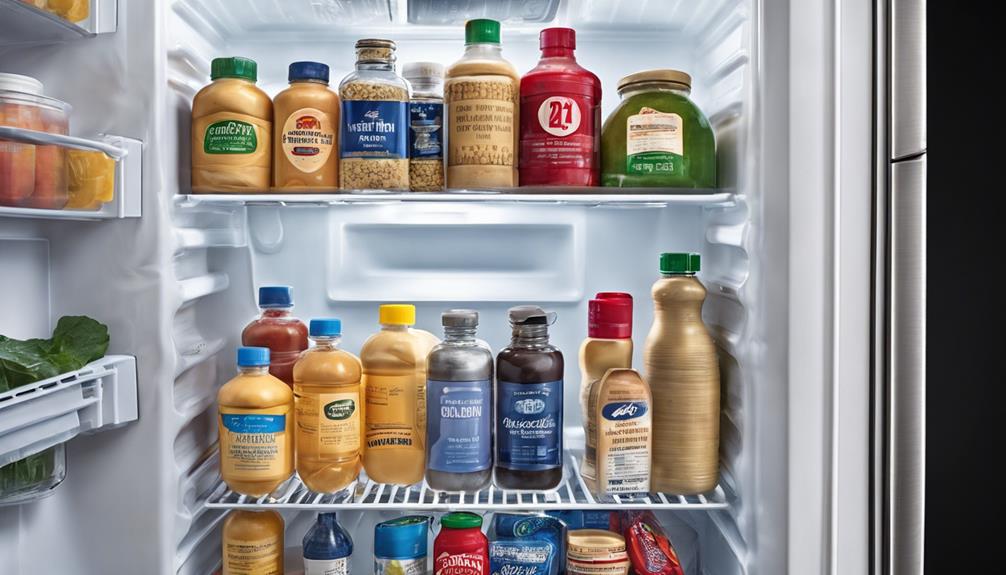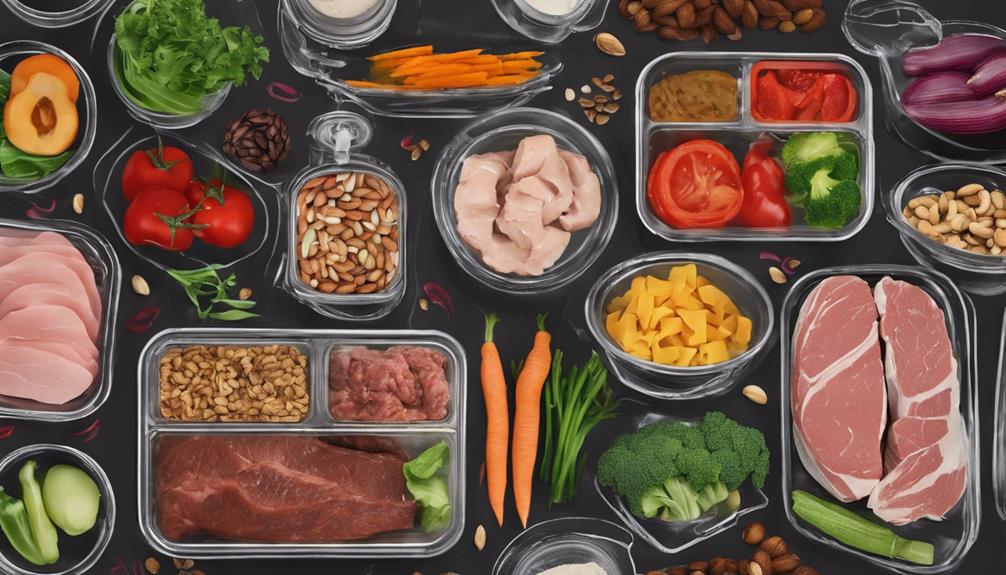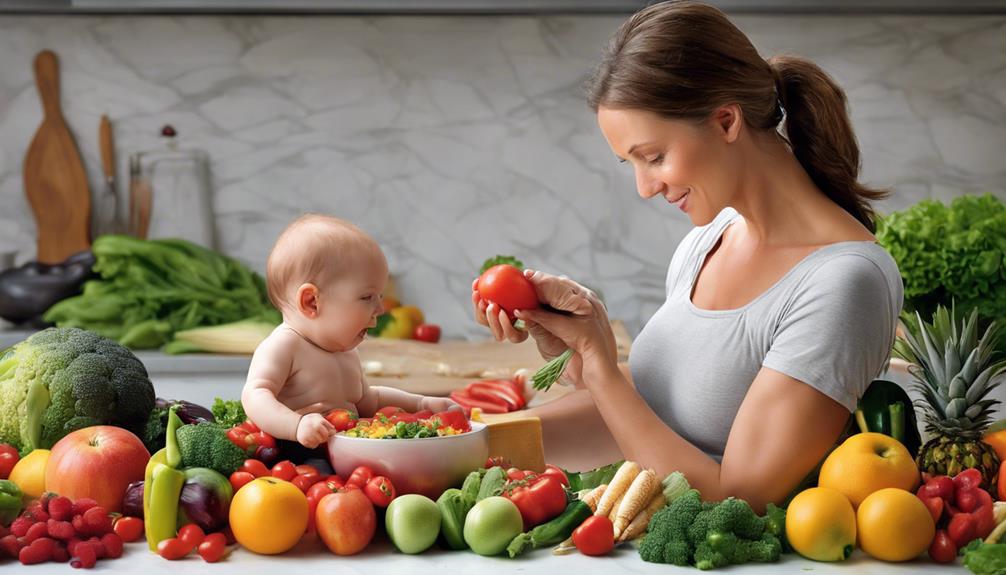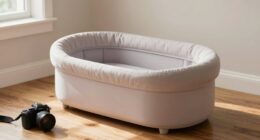Have you ever wondered how long baby formula remains important after a feeding?
Many caregivers may have differing opinions on this matter, but it's vital to understand the precise guidelines to secure your baby's health.
Proper storage and handling of formula play a significant role in maintaining its freshness and nutritional value.
Let's explore the essential factors that determine the shelf life of formula and how to navigate them effectively for your little one's well-being.
Key Takeaways
- Store prepared formula in the refrigerator within 24 hours to maintain freshness and safety.
- Discard any leftover formula after 2 hours to prevent bacterial growth and ensure quality.
- Do not leave leftover formula in the bottle for more than 2 hours to avoid contamination.
- Avoid freezing prepared formula to preserve texture and quality, following manufacturer's guidelines for storage.

Termichy Stackable Formula Dispenser Portable Milk Powder Container, 2 Pack, Warm Grey
Independent Spout and Stackable Design: Each compartment of the formula dispenser is equipped with independent funnel, they can…
As an affiliate, we earn on qualifying purchases.
As an affiliate, we earn on qualifying purchases.
Proper Storage Guidelines for Prepared Formula
When storing prepared formula, it's important to follow specific guidelines to maintain its freshness and guarantee your baby's safety. After preparing formula, any leftovers should be discarded to prevent bacterial growth.
It's important to store the formula in a clean formula container and keep it at room temperature for a maximum of 2 hours. To guarantee the best safety, any unused formula should be promptly refrigerated and used within 24 hours.
This practice not only maintains the quality of the formula but also reduces the risk of contamination, safeguarding your baby's health. By adhering to these proper storage guidelines, you can rest assured that the formula remains safe and fresh for your little one's consumption.

INTTERO Baby Bottles with Built-in Formula Dispenser, Anti-Colic Wide Neck Design for Newborn Feeding and Everyday Baby Essentials, 9 Oz Medium Flow (2 Pack), Stylish White
𝗘𝗮𝘀𝘆 𝗙𝗼𝗿𝗺𝘂𝗹𝗮 𝗣𝗿𝗲𝗽𝗮𝗿𝗮𝘁𝗶𝗼𝗻 – Built-in baby formula container to go lets you mix bottles instantly with one hand…
As an affiliate, we earn on qualifying purchases.
As an affiliate, we earn on qualifying purchases.
Shelf Life of Formula at Room Temperature

To maintain the freshness and safety of formula for your baby, it's important to be aware of the shelf life at room temperature. Here are essential facts to take into account:
- Formula Shelf Life: Formula can be kept at room temperature for up to 2 hours after preparation. It's important to feed your baby within this timeframe to guarantee the quality and safety of the formula.
- Feeding Timeframe: It's safe to feed your baby with the formula within 2 hours of preparing it. Be mindful of the clock to provide your little one with fresh and nutritious food.
- Discard After 2 Hours****: Remember to discard any leftover formula that has been sitting at room temperature for more than 2 hours. This practice is essential for your baby's health and well-being.
Following these guidelines not only maintains the quality of the formula but also safeguards your baby's health. By being attentive to the shelf life of formula at room temperature, you prioritize your baby's safety and nutrition.

Dr. Brown's All-in-One Sterilizer and Dryer for Baby Bottles, Parts and Other Newborn Essentials
BABY BOTTLE STERILIZER AND DRYER. Sterilize up to six Narrow or Wide-Neck baby bottles at once, plus bottle…
As an affiliate, we earn on qualifying purchases.
As an affiliate, we earn on qualifying purchases.
Duration of Leftover Formula in Bottle
Understanding the recommended duration for leftover formula in a bottle is important for maintaining your baby's health and safety. Leftover formula should be discarded within 2 hours after feeding to prevent bacterial growth. It's essential not to leave the bottle at room temperature for more than 2 hours.
If there's any remaining formula, make sure to discard it promptly to guarantee the freshness and quality of the milk for your baby. To extend the shelf life of prepared formula, store it in the refrigerator and use it within 24 hours.
Properly storing formula helps prevent contamination and ensures that your baby receives safe and nutritious milk. By following these guidelines, you can help safeguard your baby's well-being and provide them with the best possible nutrition.

Papablic Portable Bottle Warmer Pro — 115W Fastest Heating, Built-in Sterilizer, Baby Milk Warmer On The Go for Travel and Home, 5 Temp Settings and Keep Warm for Breastmilk & Formula (Mint Green)
Papablic Bottle Warmer Pro: 2026 Upgraded Version with Improved Usability.
As an affiliate, we earn on qualifying purchases.
As an affiliate, we earn on qualifying purchases.
Refrigeration Time for Prepared Formula

After feeding, it's important to remember that prepared formula can be safely refrigerated for up to 24 hours to maintain freshness and safety. Here are some key points to keep in mind:
- Guarantee Consumption: Utilize the refrigerated prepared formula within the 24-hour window to guarantee the quality and safety of the feed for your little one.
- Prevent Bacterial Growth: Discard any remaining formula after the recommended 24-hour period to prevent the risk of bacterial contamination and guarantee the integrity of the formula.
- Maintain Freshness: Proper refrigeration is essential in preserving the freshness and nutritional value of the prepared formula, reducing the chances of spoilage and ensuring it remains safe for consumption.
Freezing Prepared Formula
Freezing prepared formula is generally discouraged due to the potential adverse effects on texture and quality. When powdered formula is mixed with water, it should be used within one hour of preparation for best safety and freshness. It's important to prepare and store powdered formula according to the manufacturer's instructions and use prepared formula within one hour to prevent bacterial growth.
Freezing alters the consistency of the formula, potentially affecting taste and acceptability. Store Baby formula in the refrigerator and make sure it's consumed before the expiration date for the best quality. Frozen formula may separate or clump upon thawing, leading to an unpalatable feeding experience. To maintain the integrity of the formula, it's recommended to store it in a cool, dry place following preparation.
For the highest quality and safety, avoid freezing prepared formula and opt for refrigeration as the preferred storage method.
Frequently Asked Questions
How Long Can I Keep Formula After Feeding?
We should discard any formula left after feeding within 2 hours to avoid bacterial growth. It's important to prioritize your baby's safety by following guidelines. Let's guarantee freshness and quality by using opened formula within 1 month.
How Long Can Formula Stay in a Storage Container?
How long can formula stay in a storage container? Keep prepared formula at room temp for 2 hours, refrigerate for 24-48 hours. Discard leftovers after feeding. For best quality, use opened formula within a month.
How Long Is Bottle Good for After Baby Drinks From It?
Once your baby drinks from a bottle, it's best to use up any remaining formula within an hour. Safety first! Don't risk bacterial growth. Always prioritize freshness and your baby's well-being by following proper storage guidelines for formula in bottles.
Why Does Formula Go Bad After an Hour?
Formula goes bad after an hour due to bacterial contamination from the baby's mouth. Harmful bacteria multiply quickly in the nutrient-rich formula left at room temperature. To protect the baby's health, we discard leftover formula to prevent ingestion of harmful bacteria.
Conclusion
To summarize, proper storage and handling of baby formula is essential for the health and safety of infants. By following the guidelines outlined in this article, caregivers can guarantee that formula is used within appropriate timeframes, stored correctly, and discarded when necessary.
Remember, a little attention to detail can go a long way in keeping your baby happy and healthy. Stay informed, stay vigilant, and prioritize your baby's well-being above all else.









